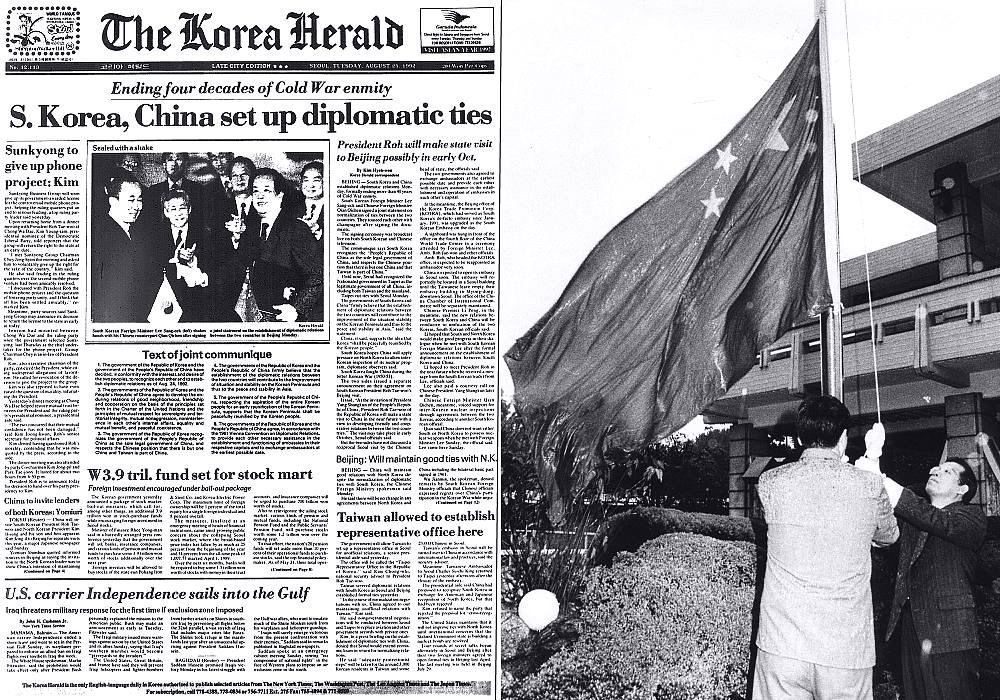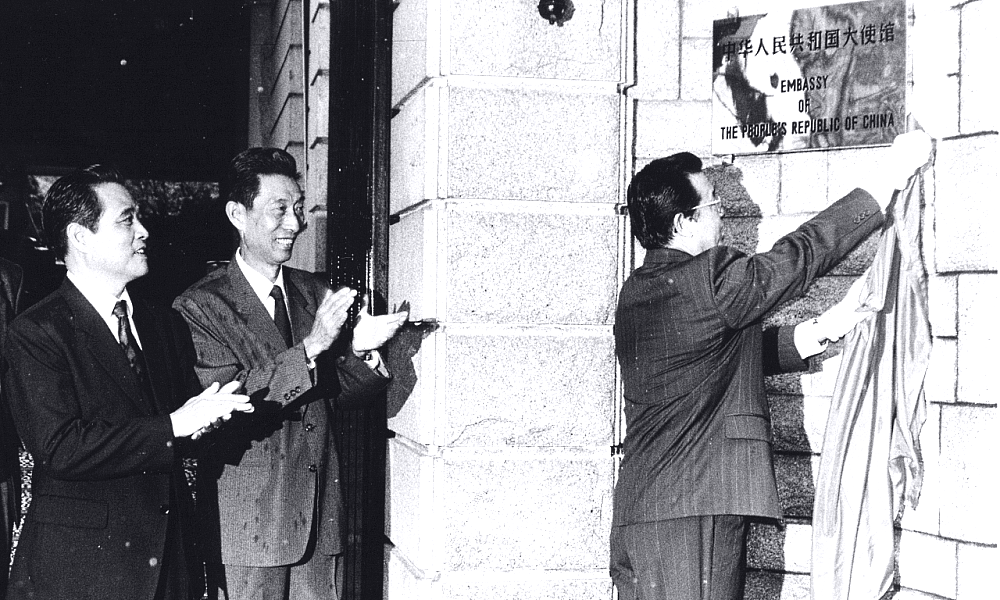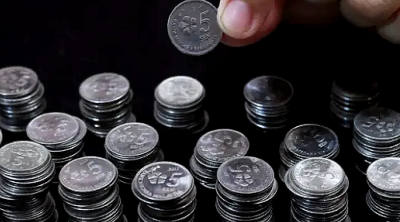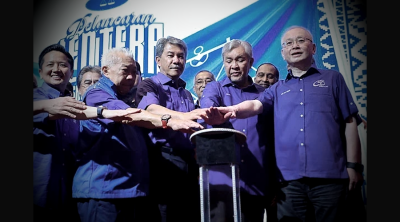In 1992, South Korea and China embarked on a new chapter in their millennia-old relationship.
The East Asian neighbors with deep historical and cultural connections were enemies during the 1950-53 Korean War and adversaries throughout the Cold War era, but on Aug. 24 of that year, they normalized ties.
The joint statement on the establishment of diplomatic ties, signed by their foreign ministers, said South Korea recognizes “the People’s Republic of China as the sole legal government of China” and accepts the “one China” policy, including Taiwan as part of China.
This led to Taipei cutting its ties with Seoul.
Handling North Korea, which was caught tampering with nuclear materials at that time, weighed heavily on the minds of Seoul officials as they pursued diplomatic channels with China, the North’s sole economic backer and ally since the dissolution of the Soviet Union.
Seoul hoped that Beijing would pressure Pyongyang to allow inter-Korean inspections of its nuclear program, reads a front page article on the Aug. 25, 1992 issue of The Korea Herald.
In the following month, President Roh Tae-woo visited China, marking the first official visit by a South Korean president to the Korean War adversary, and held summit talks with then Chinese President Yang Shangkun.

Reconciliation and partnership
The reconciliation with China came after a flurry of new diplomatic endeavors by the Roh administration, which put the country’s foreign policy on a new trajectory.
Roh’s Northern Diplomacy initiative, or Nordpolitik, saw the country forge ties with socialist countries, with Hungary and Poland in 1989 and with the Soviet Union in 1990.
Establishing diplomatic ties with China took longer than with the Soviet Union because North Korean founder Kim Il-sung was alive at the time, according to Kwon Byong-hyon, former South Korean ambassador to China from 1998 to 2000. Kim died in 1994.
“Back then, Kim Il-sung used to visit China once a year by train and met all the people he wanted to meet, and the last time he met (former Chinese leader) Deng Xiaoping was in November 1991.
As known, Kim Il-sung told Deng not to establish diplomatic relations with South Korea at least in the near future, and in case Deng has to, Kim Il-sung requested him to do so after North Korea establishes diplomatic relations with the US, or as a cross deal between South Korea-China and the US-North Korea at least at the same time,” Kwon said in an interview published in The Korea Herald on August 24, 2022, marking the 30th anniversary of South Korea-China ties.
“From China’s view, North Korea became a more important country after the Sino-Soviet conflict and it ultimately was a strategic partner that China could not lose.”
Despite the North’s opposition, however, South Korea and China decided to put four decades of ideology-driven hostility behind and embrace a new era of partnership in 1992.
An end to the Cold War had already been declared by then US President George H. W. Bush and Soviet General Secretary Mikhail Gorbachev at the Malta Summit in December 1989, a few weeks after the Berlin Wall fell.
Since bilateral ties were established, South Korea and China quickly expanded exchanges, particularly on the economic front.
Bilateral trade volume grew 48-fold from $6.38 billion in 1992 to $310.3 billion in 2022.
Over the period, Korea’s exports to China skyrocketed from a mere $1 billion to $155.7 billion.
From 1993 through 2021, Seoul consistently recorded a trade surplus in its trade with Beijing.
China has been South Korea’s largest trading partner since 2004. Korea is China’s fourth largest trading partner.
A Korea-China free trade pact was signed in 2014 and came into effect in 2015.
To sum up the Korea-China trade history, an editorial piece published in local daily the Donga Ilbo writes, “For the Korean economy, China was a blessing that arrived like lightning. Korea reaped the benefits of China’s rapid economic rise as ‘the world’s factory.’”
On the political and social fronts, however, bilateral relations have been prone to fluctuations.
In one of the high points, in 2008, leaders of the two nations elevated their ties to a “strategic cooperative partnership.”
But this partnership proved to be unstable, influenced by changes in the dynamics of South Korea-US and US-China relations.

Drifting apart
In 2016, Sino-Korea ties took a dramatic turn for the worse when Beijing banned all Hallyu content in retaliation for Seoul’s deployment of the US Terminal High-Altitude Area Defense (THAAD) missile defense system. China claimed that the US-made weapons system could be used to spy on its territory.
The anti-Korea sentiment among Chinese nationals in their 20s and 30s over THAAD gradually subsided, but then came the trade war between the US and China, which escalated in 2018 and 2019, followed by tensions over the origin of the new coronavirus that spread worldwide in 2020.
Then US President Donald Trump repeatedly referred to it as the “Chinese virus” while a Chinese Foreign Ministry spokesperson claimed without evidence that the US military had brought the virus to China.
Under the subsequent US administration led by Joe Biden, US-China tensions further escalated, with the US now seeking to exclude China from key industrial supply chains through its proposed Chip 4 alliance with South Korea, Taiwan and Japan as part of a strategy to strengthen its access to vital semiconductors and weaken Chinese involvement.
Chips are South Korea’s No. 1 export item.
The intensifying rivalry between the US and China amid the ongoing war in Ukraine and concerns over China’s growing military aggression toward Taiwan have increasingly put South Korea in a position where it can no longer stay ambiguous but be more clear about which side it is on.
The Yoon Suk Yeol administration chose closer alignment with Washington in its foreign policy, and Chinese officials have been suggesting South Korea made the wrong choice.
During his meeting with South Korea’s main opposition party leader, Chinese Ambassador to Seoul Xing Haiming warned against Korea aligning further with the US, saying those who “bet on China’s defeat will definitely regret it.”
Seoul’s Foreign Ministry called in Xing to lodge a formal complaint, and the Chinese Foreign Ministry in return summoned the South Korean ambassador to Beijing to lodge their complaint.
South Korea’s presidential office urged China to take “appropriate” measures against Xing, to which the Chinese Foreign Ministry did not respond.
The two sides, nevertheless, held their first high-level talks in months in early July, where their deputy foreign ministers agreed on the need for trade promotion and stable supply chain management.
It remains to be seen how South Korea manages its strategic partnership with China through the intensifying rivalry between the world’s two superpowers in a way that serves its own interests while maintaining peace and stability in the region.
ADVERTISEMENT
ADVERTISEMENT








































